At the beginning of 2020, the new crown virus is coming. The brokerage industry will also face an unprecedented test. What impact will the epidemic have on the brokerage industry? What opportunities and challenges will store owners and brand owners in the brokerage industry face?
Editor’s note: This article is from WeChat public account: Shell Research Institute, (ID: gh_44da0ccc8400) , author: United Federation of housing, authorized reprint
Core perspective
The impact of the new crown epidemic has the characteristics of widespread, large impact, and strong impact. Small and medium-sized intermediary companies generally face the operating dilemma of insufficient cash flow and staff turnover, as shown in:
1. In terms of market, the mainstream of interviewed experts judges that the market transaction volume has declined in the first quarter, and the market will continue to be depressed after the epidemic.
(1) In terms of market, the epidemic situation will most likely lead to an increase in market inventory and transaction volume; 80% of the interviewed experts believe that the market transaction volume will decline in the first quarter, and 60% believe that the market will continue to be sluggish after the epidemic; p>
(2) In terms of consumers, 70% of the interviewed experts expected that consumers ’home purchase demand will be delayed, and the sale of houses will be suspended or become mainstream. Buyers’ voice will increase, the bargaining space will expand, and the transaction cycle will be lengthened.
2. At the industry level, broker operations are affected, and 80% of intermediary companies are in a difficult situation.
(1) In terms of brokers, close to 90% of the brokers’ business development has been significantly affected. About 60% can not sustain for half a year, but the longer they work, the more confident the industry is.
(2) In terms of intermediary agencies, intermediary companies are under pressure from cash flow, the turnover rate is expected to increase, and cash flow is in short supply. Qicheng brokerage companies can’t sustain it for half a year. Bacheng brokerage companies are in a difficult situation.
(3) In terms of industry confidence, the industry generally expects the repair cycle to continue throughout the first quarter after the epidemic, but small and medium-sized brokerage companies and practitioners in the affected areas are more pessimistic. To cope with the shock, the intermediary company chose to manage the pressure through measures such as increasing the penetration rate of new houses, shrinking the scale, and laying off employees.
3. The level of practitioners’ demands to reduce the burden on enterprises and ensure the stability of small and medium-sized companies is the main policy requirement of the industry.
The brokerage industry’s ability to resist risks is weak, and intermediary companies are eager to obtain government support from the four major levels of rent reduction, tax concessions, flexible wage policies, and loan deferral or business loan concessions to reduce business operating costs.
_
Early 2020, the new crown virus epidemic is raging, and the duration of the epidemic has become the most important variable affecting industry confidence. Deeply caught in this “cold cold”, real estate agencies and brokers have long been overwhelmed by its “cold”, so in order to understand the demands of various parties widely, the Shell Research Institute and China Real Estate Economic Association [1] initiated the “2A questionnaire survey on the impact of new coronavirus on Chinese real estate agents in 020. More than 2,570 valid questionnaires were collected this time.
[1] China Real Estate Economic Association is the abbreviation of China Real Estate Brokers Alliance
The people participating in the survey are related practitioners in the real estate brokerage industry, and have rich experience in the industry. Among them, brokers account for over 50%, small and medium brand owners and shop owners (shop owners) account for about 30%; meanwhile, the respondents’ years of employment More than 5 years accounted for about 40%, with a certain industry experience. The respondents came from a total of 28 provinces.
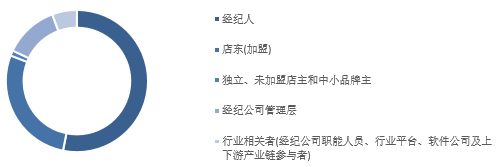
Picture: Proportion of survey participants’ structure by occupation Data source: China Real Estate Economic Association, Shell Research Institute

Figure: Structure of participating investigators by years of employment. Data source: China Real Estate Development Association, Shell Research Institute
1. In the market, the mainstream of the interviewed experts judged that the market transaction volume declined in the first quarter, and the market will continue to be sluggish after the epidemic.
In the spring of 2020, new coronaviruses will spread across the country with a raging trend. The economy and industry, consumption and investment will slow down suddenly, and industries that are not related to the national economy and people’s livelihood will almost stop. The same is true of the real estate brokerage industry. For a moment, real estate brokerage agencies throughout the country have temporarily suspended operations. Looking back on history, this industry has no history of almost no transactions. So what is the impact of this round of epidemic on the intermediary industry?
01 The market is affected by the epidemic, and there is a high probability that housing inventory will increase, and the transaction volume in the first quarter will fall
About 64% of the respondents believe that the inventory of housing will increase after the epidemic, and 63% of the experts believe that the market will continue to be depressed after the epidemic.

Figure: Judgement of market supply and demand trends after the epidemic Data source: China Real Estate Development Association, Shell Research Institute
80% of the respondents believe that the market transaction volume will decline significantly in the first quarter of 2020, of which more than 30% believe that it will fall by more than 50%.
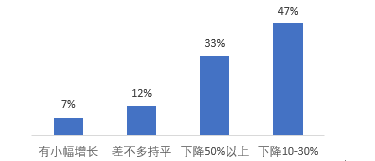
Figure: Judgment of the market transaction trend after the epidemic Data source: China Real Estate Development Association, Shell Research Institute
02 Delay in home purchase demand, buyer ’s right to speak increased, and bargaining space expanded
Over 80% of the respondents believe that the demand for buying a house will be delayed due to the impact of the epidemic, and about 60% think that the expectation of falling house prices will increase, the buyer’s right to speak will increase, and the bargaining space will expand.
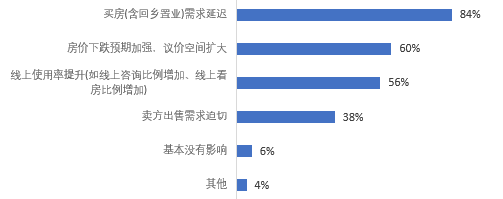
Picture: The impact of the epidemic on consumers Data source: China Real Estate Economic Association, Shell Research Institute
Specifically, more than 70% of the respondents believe that buyers will mainly suspend buying because they are unable to view the house and the market outlook is uncertain. As a result, the suspension of sales may become the mainstream. Respondents expect that more than 75% The seller will suspend the sale.
 < / p>
< / p>

Data source: China Real Estate Economic Association, Shell Research Institute
Second, Industry level, broker operations are affected, 80% of intermediary companies are in a difficult situation
01 Nearly 90% of the brokers have been affected by the epidemic, and over 60% of the brokers have not lasted for 6 months. However, the longer they work, the more confident the industry is.
73% of the brokers said that because they could not carry out watching, matching and matching normally, they were worried that the operation would become more difficult, and because the brokers were generally migrants, they needed to return to work across cities. The increase is due to the combination of these two factors, resulting in a 57% reduction in expected income. If the epidemic continues to affect, in the absence of a transaction, over 60% of brokers will not survive for 6 months and choose to leave the industry.
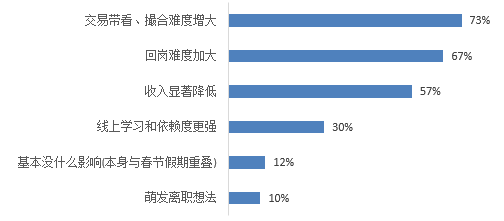
Picture: The impact of the epidemic on brokers Data source: China Real Estate Economic Association, Shell Research Institute
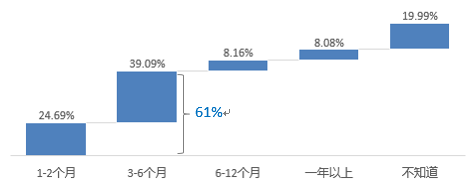
Figure: Broker’s estimate of leaving time without transaction Source: China Real Estate Economics Association, Shell Research Institute
The longer you work, the lower the probability of leaving in the short term. Brokers with more than 10 years of working experience have a richer resource accumulation and stronger economic strength. They account for 86% of those who persist for more than 2 months, and the highest proportion of 14%.
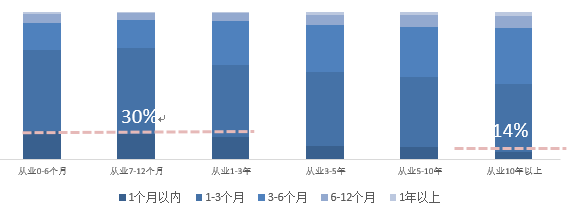
Picture: Brokers’ estimates of the time to stick to their posts with different years of employment Source: China Real Estate Development Association, Shell Research Institute
02 The cash flow of intermediary companies is under pressure, and the turnover rate is expected to increase. Qicheng brokerage companies can’t sustain it for half a year.
(1) Operating pressure has increased, and 70% of the brokerage company’s cash flow has not lasted for half a year
Over 70% of real estate agencies (store owners and brands) believe that the epidemic overlaps with the Spring Festival holiday, intensifying the suspension of transactions, significantly reducing revenue and the rigid expenditure of store rents and labor costs, a shortage of cash flow and a sluggish market A large number of personnel were lost to other industries, and the recruitment of brokers became more difficult.
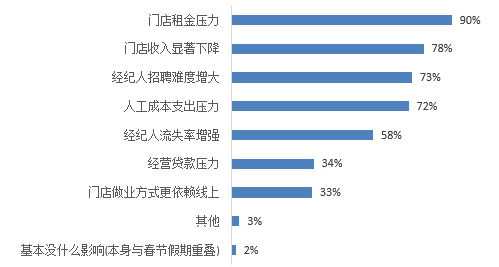
Figure: The impact of the epidemic on store owners and brands. Data source: China Real Estate Economic Association, Shell Research Institute
Small and medium-sized intermediaries have weak anti-risk capabilities and generally have insufficient cash flow reserves. In the state of no transactions, 30% of intermediary institutions cannot support the existing funds for 2 months, and 70% have clearly stated that they cannot support half a year. Taking into account that 11% of brokerage companies are uncertain, according to the average distribution of other options, it is estimated that nearly 80% of brokerage companies are in a difficult situation.
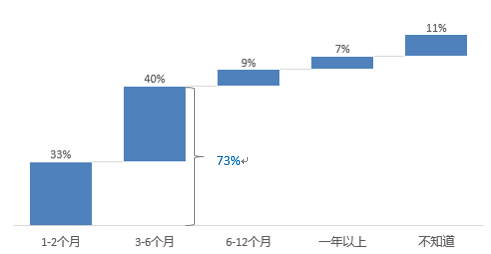
Picture: The cash flow of brokerage companies can be maintained for a long time. Data source: China Real Estate Economic Association, Shell Research Institute
(2) Business owners and management are more pessimistic, and Jiucheng expects staff to persist for up to 6 months.
The business owners and managers of intermediary companies are relatively pessimistic. Jiucheng business owners and management believe that employees do not last for 6 months without transactions, while 40% of entrepreneurs and management believe that brokers do not have transactions. Will leave within 2 months.
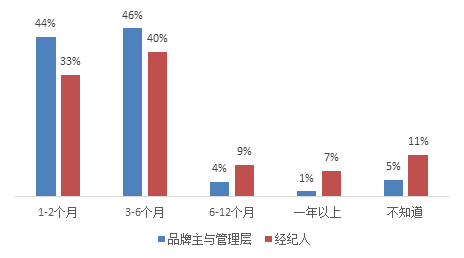
Picture: Manager’s prediction of the lost time of the broker Data source: China Real Estate Economic Association, Shell Research Institute
03 The industry generally expects that the repair cycle after the epidemic is about one quarter, but small and medium-sized brokerage companies and practitioners in the affected areas are more pessimistic.
(1) Overall, 61% of practitioners believe that the impact of the epidemic can be eliminated within one quarter, and about 50% of them expect that the impact of the epidemic will be eliminated in 1-3 months.
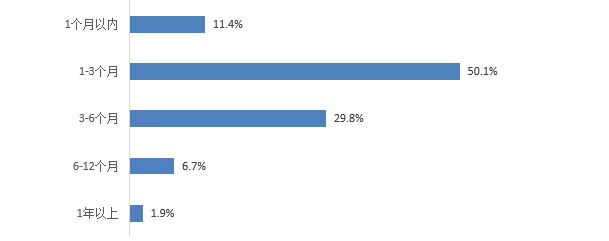
Picture: Time judgment to eliminate the impact of the epidemic on the industry Data source: China Real Estate Economic Association, Shell Research Institute
(2) In terms of occupation, SMEs are more pessimistic about their future due to operating difficulties. 59% of small and medium-sized brokerage companies and shop owners believe that the repair cycle after the epidemic is more than a quarter, which is much higher than that of brokers. 34%.
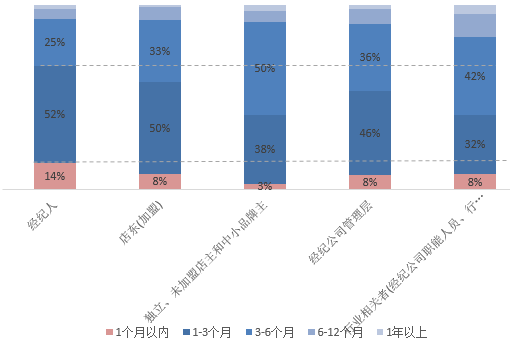
Figure: Estimates of the duration of the impact of the epidemic by practitioners of different occupations Data source: China Real Estate Economics Association, Shell Research Institute
(3) In terms of regions, the duration of the epidemic is also an important variable that affects the confidence of the industry. The industry confidence of Hubei practitioners is obviously insufficient. 64% of the practitioners in the epidemic area believe that the repair cycle is more than 3 months, which is much higher than that of non-epidemic diseases. 38% of the district.
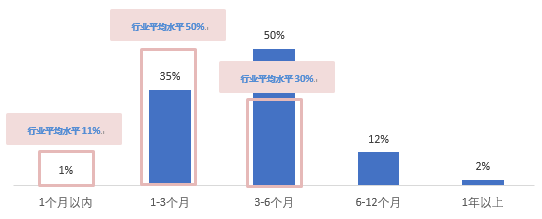
Picture: Pests in Hubei’s epidemic area estimate the impact time of the epidemic situation Data source: China Real Estate Economic Association, Shell Research Institute
(4) To cope with the impact, the intermediary company will choose to increase the penetration of new housing channels, or shrink the scale and layoffs.
In response to this severe operating pressure, considering that developers need to quickly withdraw funds after the epidemic has ended, and channel dependence has further increased, 54% of brokers will increase channel penetration for new homes.
Followed by cost reductions, brokerage agencies that chose to reduce advertising costs, reduce post-mid-level functional staff, and software expenses accounted for 26%, 25%, and 23%, respectively. It is speculated that operating pressure will also be transmitted Advertising platforms and software companies, it is worth noting that 21% of brokerage agencies plan to close stores, reduce their size, or will usher in a wave of store closures and a large number of brokers losing their jobs.
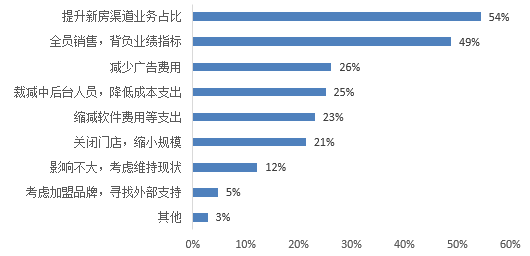
Picture: The response strategies of brokerage agencies in the face of the epidemic impact. Data source: China Real Estate Development Association, Shell Research Institute
III. Practitioners’ requirements, reduce the burden on enterprises, and ensure the stability of small and medium-sized companies as the main policy requirements of the industry
01 Real estate agencies most expect rent concessions, followed by flexible pay policies
Facing the dilemma of tight cash flow and increasing operating pressure, 75% of real estate agencies expect clear rent preferential policies; 59.7% of brokers want policy support to discuss flexible wages with their employees. Delaying issuance will reduce labor costs on the basis of providing certain salary protection for employees; while 54.7% of brokerage agencies hope to get preferential policies such as corporate income tax and real estate tax. In other cases, the delay in monthly supply and the provision of operating loans have become the main demands.
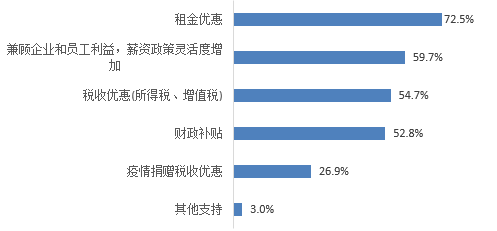
Figure: Expected policy support from real estate agenciesData source: China Real Estate Economic Association, Shell Research Institute
02 Agents look forward to a tax concession and rent subsidy to protect their lives
Under the epidemic situation, brokers also need to face the problems of suspension of transactions and sharp decline in revenue. Among them, 58.5% of the brokers hope to receive tax deductions or preferential policies in the first quarter of 2020 to reduce individual tax expenditures. In other policies, the broker hopes to get preferential rents and mortgages to reduce the cost of living in order to protect basic living.
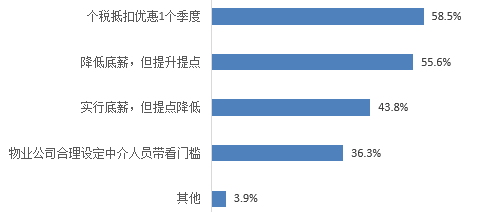
Photo: The policy support that the broker expects. Data source: China Real Estate Economic Association, Shell Research Institute
Conclusion
Early in 2020, this nation-wide epidemic of the new crown virus epidemic has a large scope and extensive impact, and all parties in the brokerage industry are spared: stagnation in second-hand housing transactions, sluggish market, delayed consumer demand, brokers The operation was blocked, and 90% of the brokers’ operations were affected. In the face of the double impact of revenue cuts and rigid costs, small and medium-sized shopkeepers were struggling and suffered from the shortage of cash flow. This survey shows that, in the absence of transactions, cash flow is short, and 70% of the intermediary companies cannot support it for half a year, and 80% of the brokerage companies are in trouble.
Under the epidemic, in the face of multiple operating pressures, small and medium-sized brokerage companies are expected to be more pessimistic in the future. Therefore, from the income side, 54% of the brokerage companies will pay more attention to the new home channel business; from the cost side, more than 20% of the brokerage companies It will choose to shrink scale, reduce staff, reduce advertising and software costs, or cause mass unemployment.
Under such a difficult situation of the brokerage industry, coupled with the weak anti-risk attributes and weak self-repair ability of the brokerage industry, it is particularly important to boost the confidence of the industry through policy support.
As one of many industries, the problems faced by the intermediary industry have a certain representative significance in the industry, especially the survival problems of small and micro enterprises and enterprise employees after the epidemic. How to support and guide enterprises to maintain operations so as to avoid the breeding of large-scale social and economic instability factors is an important issue that cannot be ignored at present.



 < / p>
< / p>
01 Nearly 90% of the brokers have been affected by the epidemic, and over 60% of the brokers have not lasted for 6 months. However, the longer they work, the more confident the industry is.
73% of the brokers said that because they could not carry out watching, matching and matching normally, they were worried that the operation would become more difficult, and because the brokers were generally migrants, they needed to return to work across cities. The increase is due to the combination of these two factors, resulting in a 57% reduction in expected income. If the epidemic continues to affect, in the absence of a transaction, over 60% of brokers will not survive for 6 months and choose to leave the industry.

Picture: The impact of the epidemic on brokers Data source: China Real Estate Economic Association, Shell Research Institute

Figure: Broker’s estimate of leaving time without transaction Source: China Real Estate Economics Association, Shell Research Institute
The longer you work, the lower the probability of leaving in the short term. Brokers with more than 10 years of working experience have a richer resource accumulation and stronger economic strength. They account for 86% of those who persist for more than 2 months, and the highest proportion of 14%.

Picture: Brokers’ estimates of the time to stick to their posts with different years of employment Source: China Real Estate Development Association, Shell Research Institute
02 The cash flow of intermediary companies is under pressure, and the turnover rate is expected to increase. Qicheng brokerage companies can’t sustain it for half a year.
(1) Operating pressure has increased, and 70% of the brokerage company’s cash flow has not lasted for half a year
Over 70% of real estate agencies (store owners and brands) believe that the epidemic overlaps with the Spring Festival holiday, intensifying the suspension of transactions, significantly reducing revenue and the rigid expenditure of store rents and labor costs, a shortage of cash flow and a sluggish market A large number of personnel were lost to other industries, and the recruitment of brokers became more difficult.

Figure: The impact of the epidemic on store owners and brands. Data source: China Real Estate Economic Association, Shell Research Institute
Small and medium-sized intermediaries have weak anti-risk capabilities and generally have insufficient cash flow reserves. In the state of no transactions, 30% of intermediary institutions cannot support the existing funds for 2 months, and 70% have clearly stated that they cannot support half a year. Taking into account that 11% of brokerage companies are uncertain, according to the average distribution of other options, it is estimated that nearly 80% of brokerage companies are in a difficult situation.

Picture: The cash flow of brokerage companies can be maintained for a long time. Data source: China Real Estate Economic Association, Shell Research Institute
(2) Business owners and management are more pessimistic, and Jiucheng expects staff to persist for up to 6 months.
The business owners and managers of intermediary companies are relatively pessimistic. Jiucheng business owners and management believe that employees do not last for 6 months without transactions, while 40% of entrepreneurs and management believe that brokers do not have transactions. Will leave within 2 months.

Picture: Manager’s prediction of the lost time of the broker Data source: China Real Estate Economic Association, Shell Research Institute
03 The industry generally expects that the repair cycle after the epidemic is about one quarter, but small and medium-sized brokerage companies and practitioners in the affected areas are more pessimistic.
(1) Overall, 61% of practitioners believe that the impact of the epidemic can be eliminated within one quarter, and about 50% of them expect that the impact of the epidemic will be eliminated in 1-3 months.

Picture: Time judgment to eliminate the impact of the epidemic on the industry Data source: China Real Estate Economic Association, Shell Research Institute
(2) In terms of occupation, SMEs are more pessimistic about their future due to operating difficulties. 59% of small and medium-sized brokerage companies and shop owners believe that the repair cycle after the epidemic is more than a quarter, which is much higher than that of brokers. 34%.

Figure: Estimates of the duration of the impact of the epidemic by practitioners of different occupations Data source: China Real Estate Economics Association, Shell Research Institute
(3) In terms of regions, the duration of the epidemic is also an important variable that affects the confidence of the industry. The industry confidence of Hubei practitioners is obviously insufficient. 64% of the practitioners in the epidemic area believe that the repair cycle is more than 3 months, which is much higher than that of non-epidemic diseases. 38% of the district.

Picture: Pests in Hubei’s epidemic area estimate the impact time of the epidemic situation Data source: China Real Estate Economic Association, Shell Research Institute
(4) To cope with the impact, the intermediary company will choose to increase the penetration of new housing channels, or shrink the scale and layoffs.
In response to this severe operating pressure, considering that developers need to quickly withdraw funds after the epidemic has ended, and channel dependence has further increased, 54% of brokers will increase channel penetration for new homes.
Followed by cost reductions, brokerage agencies that chose to reduce advertising costs, reduce post-mid-level functional staff, and software expenses accounted for 26%, 25%, and 23%, respectively. It is speculated that operating pressure will also be transmitted Advertising platforms and software companies, it is worth noting that 21% of brokerage agencies plan to close stores, reduce their size, or will usher in a wave of store closures and a large number of brokers losing their jobs.

Picture: The response strategies of brokerage agencies in the face of the epidemic impact. Data source: China Real Estate Development Association, Shell Research Institute
III. Practitioners’ requirements, reduce the burden on enterprises, and ensure the stability of small and medium-sized companies as the main policy requirements of the industry
01 Real estate agencies most expect rent concessions, followed by flexible pay policies
Facing the dilemma of tight cash flow and increasing operating pressure, 75% of real estate agencies expect clear rent preferential policies; 59.7% of brokers want policy support to discuss flexible wages with their employees. Delaying issuance will reduce labor costs on the basis of providing certain salary protection for employees; while 54.7% of brokerage agencies hope to get preferential policies such as corporate income tax and real estate tax. In other cases, the delay in monthly supply and the provision of operating loans have become the main demands.

Figure: Expected policy support from real estate agenciesData source: China Real Estate Economic Association, Shell Research Institute
02 Agents look forward to a tax concession and rent subsidy to protect their lives
Under the epidemic situation, brokers also need to face the problems of suspension of transactions and sharp decline in revenue. Among them, 58.5% of the brokers hope to receive tax deductions or preferential policies in the first quarter of 2020 to reduce individual tax expenditures. In other policies, the broker hopes to get preferential rents and mortgages to reduce the cost of living in order to protect basic living.

Photo: The policy support that the broker expects. Data source: China Real Estate Economic Association, Shell Research Institute
Conclusion
Early in 2020, this nation-wide epidemic of the new crown virus epidemic has a large scope and extensive impact, and all parties in the brokerage industry are spared: stagnation in second-hand housing transactions, sluggish market, delayed consumer demand, brokers The operation was blocked, and 90% of the brokers’ operations were affected. In the face of the double impact of revenue cuts and rigid costs, small and medium-sized shopkeepers were struggling and suffered from the shortage of cash flow. This survey shows that, in the absence of transactions, cash flow is short, and 70% of the intermediary companies cannot support it for half a year, and 80% of the brokerage companies are in trouble.
Under the epidemic, in the face of multiple operating pressures, small and medium-sized brokerage companies are expected to be more pessimistic in the future. Therefore, from the income side, 54% of the brokerage companies will pay more attention to the new home channel business; from the cost side, more than 20% of the brokerage companies It will choose to shrink scale, reduce staff, reduce advertising and software costs, or cause mass unemployment.
Under such a difficult situation of the brokerage industry, coupled with the weak anti-risk attributes and weak self-repair ability of the brokerage industry, it is particularly important to boost the confidence of the industry through policy support.
As one of many industries, the problems faced by the intermediary industry have a certain representative significance in the industry, especially the survival problems of small and micro enterprises and enterprise employees after the epidemic. How to support and guide enterprises to maintain operations so as to avoid the breeding of large-scale social and economic instability factors is an important issue that cannot be ignored at present.

